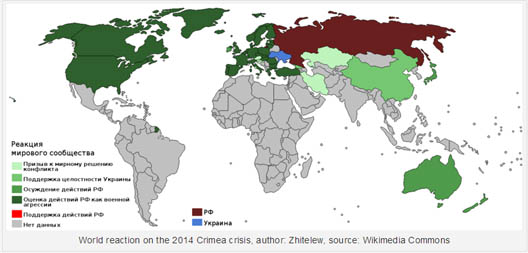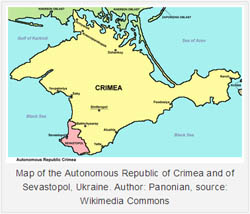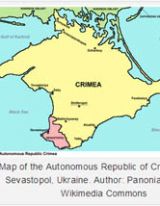Russia’s invasion of Ukraine is part of the highest-stakes gambits of President Putin’s career. Putin is not bent on war or on dismembering Ukraine. Rather, he seeks to reverse his humiliating defeat in failing to intimidate Ukraine into abandoning its return to Europe.
 Legend / Wikipedia: World reaction on the 2014 Crimea crisis: brown – Russia; blue – Ukraine; salad green – for peaceful solution of the conflict; light green – support of the Ukraine territorial integrity; green – condemnation of the Russian actions; dark green – interpretation of the Russian actions as a military intervention.
Legend / Wikipedia: World reaction on the 2014 Crimea crisis: brown – Russia; blue – Ukraine; salad green – for peaceful solution of the conflict; light green – support of the Ukraine territorial integrity; green – condemnation of the Russian actions; dark green – interpretation of the Russian actions as a military intervention.
Desperate to restore his political authority and avoid the loss of his great strategic prize—a unified Ukraine entering his Eurasian Economic Union— Vladimir Putin has adopted extreme tactics. His repudiation of Russia’s commitment to guarantee Ukraine’s sovereignty and territorial integrity (in the 1994 Budapest Memorandum) and use of force against a completely unthreatening neighbour underscore the Russian president’s desperation. But Putin is not irrational. On the contrary, he is using force in Crimea carefully and cleverly as a negotiating tactic to probe Western leaders in an effort to push how far Russia troops can advance before the costs outweigh the benefits—an effort that has huge potential consequences for Estonia and for the West as a whole.
Related Content
|
Post-Euromaidan “Quietness”
Until March 2, Western leaders and journalists pretended Putin’s political-military poker game simply did not exist. As Moscow ratcheted up pressure on Kyiv to keep Ukraine out of Europe and in Russia’s orbit, President Obama and Secretary Kerry sunnily claimed Ukraine was not the object of an East-West tug-of-war.
The world watched on TV as “unidentified” troops wearing uniforms with no insignia occupied government buildings and civilian airports in Crimea on March 2.
Experts quickly recognized their equipment as unique to Russian special forces units, and one soldier even admitted to CNN’s Diana Magnay that he was from Russia. Yet, State Department Spokesperson Jen Psaki disingenuously announced the U.S. could not confirm that these were in fact Russian troops. Apparently, the State Department had decided to put more faith in President Putin’s outright lies that there were no Russian troops in Ukraine outside the naval base in Sevastopol than in what must have been a flood of U.S. intelligence information to the contrary.
The U.S. government’s strategic blindness was reinforced by leading TV journalists. On March 1, a BBC World News anchor opined during his 10 a.m. GMT broadcast that the military occupation of Ukraine’s Simferopol and Sevastopol Airports “…have the air of a great misunderstanding…,” in which Russian troops on exercises adjacent to the border may have accidentally strayed into Ukraine.
Unable to believe Putin could really be invading Ukraine, this journalist failed to mention that President Putin had ordered this exercise in reaction to Viktor Yanukovych’s ouster, and included nearly as many troops as the American “surge” in Afghanistan in 2010-11.
This willingness to be deceived by Moscow in was similarly evident when a CNN anchor argued on March 2 that Ukrainian Prime Minister Yatsenyuk was “escalating tension” by responding as any responsible leader would when being invaded: that his country would defend itself.
Lessons from the Past: 19th – 21st Century
Had U.S officials and Western journalists taken a peek at Russian history, they would have recognized that Putin was deliberately acting in accordance with imperial-era Russian diplomacy. Throughout the 19th Century, tsars used a similar pretext of defending their Orthodox co-religionists in neighbouring states to justify military assaults, including during the Crimean War in the mid-1850s. Astoundingly, many Westerners have expressed sympathy with Russia’s 19th Century justification of its 21st Century invasion of Crimea. But, imagine the outrage if Germany had sent troops into France’s Alsace-Lorraine to protect ethnic Germans and/or German speakers in, say, 1968, when the end of World War II was as recent as the collapse of the Soviet Union is to the present. Russia’s invasion of Ukraine should be equally unthinkable today.
Some Western observers also cite “Russia’s concerns about threats” to its naval base base in Sevastopol to justify Moscow’s invasion. In reality, however, no person in authority in Ukraine has even hinted at any such threats.
Collectively, the above attitudes constitute complicity with Russia’s aggression by sending a powerful and dangerous message to President Putin: the Euro-Atlantic community does not recognize Russia’s violations of international law or invasion of a neighbouring country as strategic concerns.
It is difficult to imagine why Putin would think otherwise, given the Euro-Atlantic community’s tepid response to Russia’s invasion of Georgia in August 2008. In hindsight, that military adventure in the Caucasus served as a warm-up for Crimea 2014.
Deciding to punish the West (for recognizing Kosovo’s independence) and Georgian President Mikheil Saakashvili (for pursuing membership in NATO), Putin used a similar set of pressure tactics as he is now employing in Crimea: installing puppet regimes in Georgia’s breakaway regions of Abkhazia and South Ossetia; issuing Russian passports to non-ethnic Georgian residents of those regions; escalating military tension (by shooting down a Georgian reconnaissance drone and deploying troops to the breakaway regions in violation of existing agreements); and launching a giant military exercise (Kavkaz ’08) as a platform for invasion.
The Western response during the four years between Russia’s first illegal military deployments into Georgia (in June 2004) until its invasion (in August 2008) only encouraged further aggression from Putin. The Euro-Atlantic community focused on deterring a supposedly impulsive Saakashvili from angering Putin rather than on pressing Russia to cease its military and diplomatic provocations aimed at backing Saakashvili into an impossible choice: accept the loss of Abkhazia and South Ossetia or go to war with Russia.
Western Visions
This Western attitude was also reflected in NATO’s disastrous decision at its Bucharest Summit in April 2008 to deny Georgia a Membership Action Plan (MAP), which would have formalized the start of the country’s NATO accession process. Despite strong support for a Georgia MAP from U.S. President George W. Bush, German Chancellor Angela Merkel vetoed Georgia’s MAP but agreed to a statement that “Georgia and Ukraine will be members of NATO.”
The message to Putin was, “Act sooner rather than later or risk the escape of Georgia and Ukraine into a military alliance that will forever deter Russian military aggression against them.”
Putin, of course did act, invading Georgia four months later. Russia defeated the Georgian military decisively, and to this day occupies both South Ossetia and Abkhazia, just a few miles from Sochi’s Olympic venues. Shamefully, not a single Western leader mentioned Russia’s military occupation of Georgia during the Olympic Winter Games, an omission that obviously did not help the West dissuade Putin from military adventurism in Ukraine.
Practice of Today
The lesson of Russia’s invasions of Georgia and Ukraine is that Putin will keep pressing his advantage unless and until Western leaders stand together and demonstrate that there will be severe costs of continued Russian military aggression in Ukraine, (as well as in Georgia and Moldova, as they prepare in August/September to sign the same EU Association Agreements that prompted Putin’s intimidation of Yanukovych in November 2013).
Fortunately, the strategic tide may now be turning. Washington has shifted from President Obama’s toothless “expression of concern” on March 1 to Secretary of State Kerry’s firm calls to isolate Russia. Canadian Prime Minister Harper, UK Foreign Secretary Hague, and Polish Foreign Minister Sikorski have echoed these calls for the punitive actions that could alter Putin’s strategic calculus, while at an extraordinary meeting on March 2, Estonia’s National Defense Council expressed support for “the most powerful counter-measures” to Russia’s military activities in Ukraine.
Characteristically, Germany seems resistant, initially warning against any tough actions that might anger Putin, and now suddenly opposing a forceful response because Putin’s iron will is supposedly unbreakable. In response to Secretary Kerry’s calls to isolate Russia, Chancellor Merkel seeks mediation between Russia and Ukraine—ignoring that there is nothing to mediate.
Russia is the one escalating a crisis it precipitated, even as Ukraine shows remarkable restraint. Moreover, the fact-finding mission, dialogue, and observers under the auspices of the Organization of Security and Cooperation in Europe (OSCE) that Merkel “convinced” Putin to accept on March 2 play right into Putin’s objective of freezing military facts on the ground.
It is therefore no surprise that the Russian leader has accepted Merkel’s suggestion. Indeed, these very same measures played into Russia’s hands in the mid-1990’s, securing Russia’s military presence on Georgian soil and freezing the South Ossetia and Abkhazia conflicts until they erupted into warfare again in August 2008.
Time for Action
Contrary to Germany’s preferred course of appeasement, now is the time for decisive action in Euro-Atlantic capitals to strengthen the West’s negotiating hand with Russia. The first step on which all others will be based is a forceful and unified articulation by the United States, European Union and NATO that:
- Condemns Russia’s use of force in Ukraine;
- Demands the withdrawal of Russian troops;
- Warns of specific political and economic sanctions Russia will incur if its troops move deeper into Ukraine;
- Stresses the West’s strategic interest in and support for Ukraine, as well as Georgia and Moldova, integrating with the Euro-Atlantic community, beginning with signature of their Association Agreements with the EU; and
- Reiterates NATO’s commitment at both its Bucharest (2008) and Chicago (2012) Summits that “Ukraine and Georgia will be members of NATO” once they fulfill all accession criteria.
Beyond these words, the West must also take action. Suspending planning for Russia’s G-8 Summit in Sochithis June is a toothless gesture, which risks reinforcing Putin’s calculation that top Western leaders fear his reaction to concrete steps. Indeed, President Putin boycotted the G-8 Summit hosted by President Obama in 2012, apparently unafraid of the G-7’s response. At a minimum, G-7 members should announce they will boycott the Sochi G-8 meeting, and intend to expel Russia from the G-8. After all, Russia is not one of the world’s eight largest economies; moreover, President Putin has reversed the domestic reforms and international collaboration (including Russia’s guarantee of Ukraine’s territorial integrity) that G-8 membership was intended to reward under President Yeltsin in the mid-1990’s.
Trans-Atlantic View
 Secretary of State Kerry has suggested even more significant steps that could further shape Putin’s cost/benefit analysis. These include economic sanctions against Russia, such as trade restrictions, asset freezes, and visa restrictions against those officials responsible for the invasion of Ukraine.
Secretary of State Kerry has suggested even more significant steps that could further shape Putin’s cost/benefit analysis. These include economic sanctions against Russia, such as trade restrictions, asset freezes, and visa restrictions against those officials responsible for the invasion of Ukraine.
Secretary Kerry’s mere mention of these options on March 2 already seems to be having some impact, contributing to the Moscow stock market dropping 12% and the ruble reaching a record low against the dollar and euro on March 3.
Western countermeasures should also include political-military steps, which will sharply raise the costs of Russia’s military adventurism—even if the use of force remains off the table. U.S. Senator McCain has suggested resurrecting U.S. plans to deploy the missile defense assets in Polandand the Czech Republic that the Obama Administration cancelled as part of its doomed reset policy. A series of diplomatic steps at NATO could also alter Putin’s course of action in Ukraine.
The most decisive move would be to resume Georgia’s move toward NATO membership by granting Georgia a Membership Action Plan at NATO’s summit in Wales this coming September.
In addition, the Alliance could freeze the NATO-Russia Council (as following Russia’s invasion of Georgia in August 2008) and invigorate the NATO-Ukraine Council.
The Baltic context: Estonia and Allies
This last step is one of a series of substantive measures suggested by Supreme Allied Commander in Europe Admiral James Stavridis.
The former commander of all NATO military forces suggests using the NATO-Ukraine council and military partnerships with Ukraine to share information, intelligence, and situational awareness garnered from satellites, drones, and cyber capabilities.
Admiral Stavridis further recommends that the Alliance raise the alert level of the NATO Response Force, comprising 25,000 army, navy, and special forces personnel. He also suggests establishing and fully staffing crisis management centers at key NATO facilities (including NATO’s military headquarters at SHAPE in Belgium) to focus on the crisis in Ukraine. More robustly, Stavridis calls on NATO to develop contingency plans for possible Russian military moves into Ukraine and beyond, and to consider sailing NATO ships into the Black Sea. Finally, the former SACEUR suggests that NATO and its member states offer cyber defense cooperation to Ukraine, echoing Estonia’s support to the Georgian Government against the cyber attacks that accompanied Russia’s kinetic assault in August 2008.
Of even greater significance to Estonia is a suggestion by U.S. Senator Lindsey Graham for NATO to consider deploying troops to the Baltic states. Such a move might be seen as violating the NATO-Russia Founding Act of 1996, in which NATO pledged “no additional permanent stationing of substantial combat forces” in countries that would accede to NATO, except “when necessary, in the event of defence against a threat of aggression and missions in support of peace consistent with the United Nations Charter and the OSCE governing principles. Clearly, such a threat of aggression currently exists.
Estonia can and should contribute to these efforts in meaningful ways, even if it would be unwise to lead the charge on troop deployments to the Baltic, and even if it alone cannot decisively influence EU and NATO decisions on many of the above steps. ,. Tallinn should, of course, express its support for all of the above measures behind closed doors in Brussels. Moreover,
Estonia should also confer quietly with its NATO neighbours and with Sweden and Finland on how to clear the way for possible NATO troop deployments to the Baltic-Nordic region.
Finally, Estonia should take the lead in NATO and the EU on two issues in support of the Euro-Atlantic aspirations of Ukraine, Georgia, and Moldova on which Estonia enjoys considerable expertise: cyber defense; and political, economic, and security reforms required for integration into the EU and NATO.
Amb. Matthew Bryza has been the Director of the International Centre for Defence Studies in Tallinn, Estonia since 2012. A US diplomat for over 23 years, he finished his career as Ambassador to Azerbaijan. During 2005 to 2009, Ambassador Bryza served as Deputy Assistant Secretary of State for Europe and Eurasia, with responsibility for the South Caucasus, Turkey, Greece, Cyprus, and Eurasian energy. Ambassador Bryza simultaneously served as the U.S. Co-Chair of the OSCE’s Minsk Group mediating the Nagorno-Karabakh conflict, and as U.S. mediator of the Cyprus, South Ossetia, and Abkhazia conflicts.
